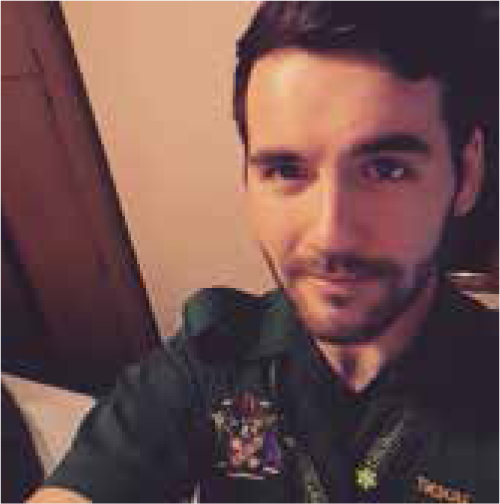Q. Who or what inspires/inspired you on your journey as a student paramedic?

I didn't grow up wanting to be a paramedic—it is something that I fell into. I started 4.5 years ago on Patient Transport and progressed into Urgent Care for a private ambulance company. While on an urgent-care shift, my colleague and I were sent to attend an elderly patient who was confused and lethargic. When we arrived, the patient was very sick; tachycardic, hypotensive, pyrexial, hyperglycaemic—you name it. I just remember having this feeling of knowing that this patient needed a level of care that I just couldn't provide—and I felt useless.
We requested paramedic assistance—which felt like it took forever with a patient that sick—but the two paramedics who came were amazing and reassured us that we had done the right thing asking for help. We helped the crew to get the patient onto the ambulance and they took the patient into hospital on a standby.
After that incident, I knew that I wanted to equip myself with as much knowledge and skill as I could to help people—I applied to be an Emergency Medical Technician 1 the very next day and started working on the Paramedic Emergency Service for North West Ambulance Service a few months later. Fast forward 3 years and I'm in my 2nd year of my DipHE at Edge Hill University.
My mentor said to me:
‘As long as you can go home after a shift and not lose sleep—knowing that you've done your best for every patient, you'll do well in this profession.’
That really struck me and it's something I strive to achieve every time I put on my uniform.
Q. What is your experience of mentorship?

As students, we're in a period of transition, so having a supportive mentor is of great importance. Good mentors can support our learning while integrating us into the prehospital setting—this is especially true for those who see us over an extended period.
However, while this is achievable, there are real differences when on placement, for example, on elective placements. About a third of placement hours are non-ambulance placements in settings like the emergency department or on acute wards and, occasionally, I feel a bit out of place.
Often, hospital staff don't know the scope of a student paramedic, so they don't know how to support us. While I don't mind changing hospital beds, it's not the most constructive use of my limited time there. However, you have to make the best of the situation—find a friendly doctor and ask to shadow them. Ask questions and ask to be involved; they're busy enough to carry on without you otherwise.
My experience of ambulance placements has been positive. My primary mentor was a paramedic, whom I would be with for the majority of my placement and he was excellent. Over time, we built trust in each other. I learnt how the crew worked and they could gauge my ability and ‘loosen the reigns’—letting me attend, all while keeping a close watch.
The disadvantage is that you may end up emulating your mentor's actions—for better or for worse. Classmates in larger stations have a pool of mentors, but they say this can lead to a lack of continuity between mentors and students. Either way, I'm enjoying my final year and (nervously) look forward to qualifying.
Q. What is the biggest challenge you face as a student paramedic?

Your first learning curve as a student paramedic will likely be juggling emotions you have never felt. You can never truly know what to expect when out in the ambulance. Exciting, exhilarating and enthralling, but it's terrifying as much as it is fascinating. You cannot protect yourself from what you see, nor choose who will depend on you and your crew in a life-threatening scenario—a sick child, an elderly patient with dementia struggling to remember her loved ones, or a grieving family member. You'll have done your training, know the motions and the catchy mnemonics, but you will instantly forget them on your first job. Replaced rather by sweat and a dry mouth, with a dash of panic. I believe all of these challenges, as great as they are, mould you into a staunch person. You learn to keep calm under pressure, and that your colleagues are there for you—but most of all, you realise your patient is relying on you to be strong for them. This is what gives you strength. Like a duck on water, calm on the surface but flapping underneath.
You face many challenges as a student paramedic, some physical, but most emotional. Exam stress, tiredness or wee-holding on a moving ambulance. The role is difficult, but the rewards are worth the trials.
It is an amazing privilege to be a student in a profession with such an exciting future. I have met amazing colleagues, made lifelong friends, and experienced scenarios I never thought I'd see. To think, it all started watching Emergency Bikers on Channel 5.

